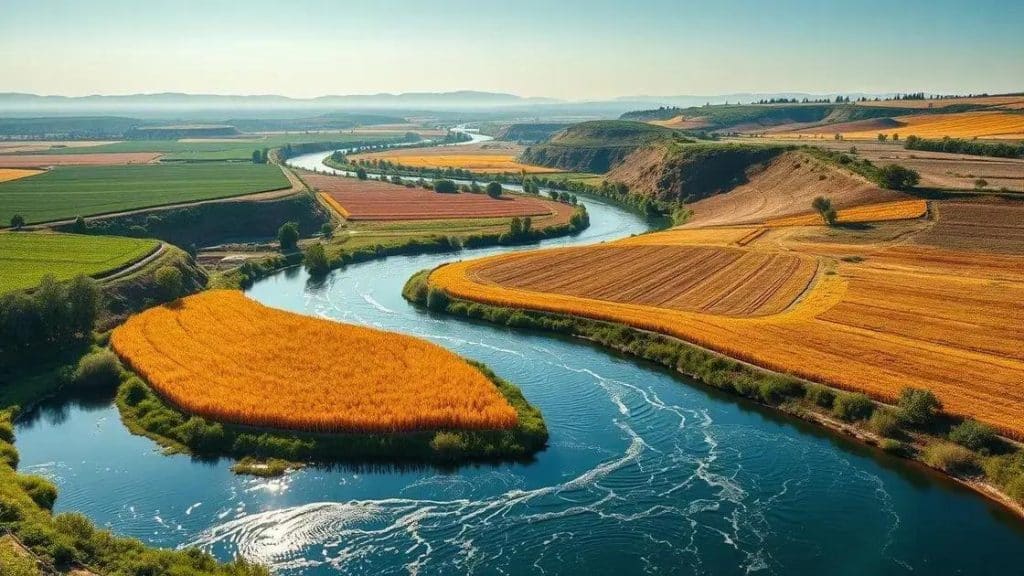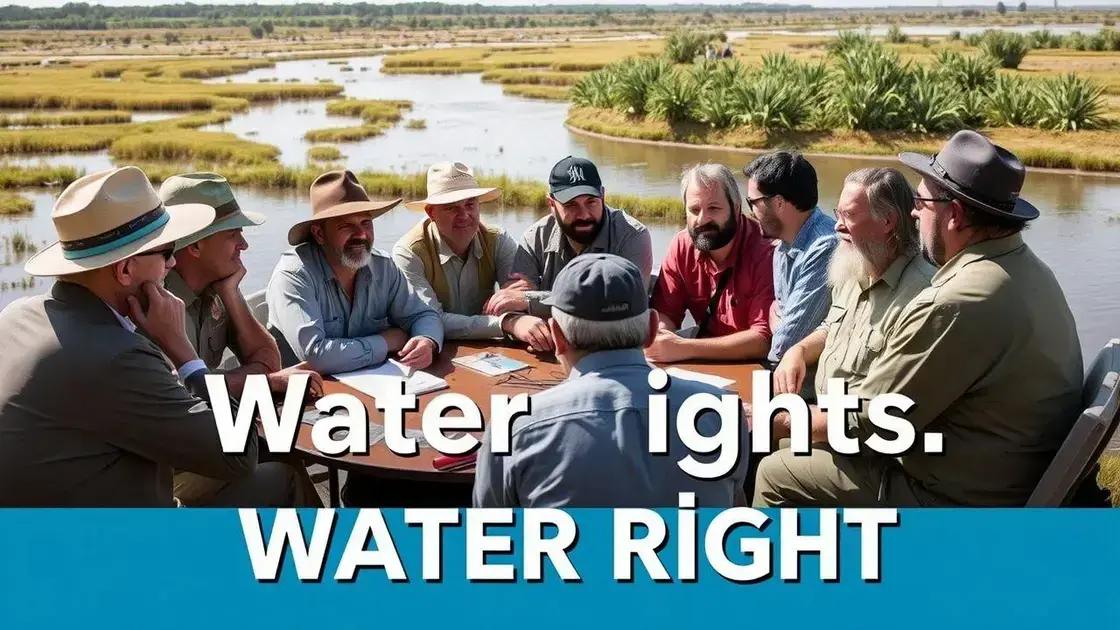Water rights dispute leads to lawsuit: what you need to know

Anúncios
Water rights disputes involve conflicts over the legal rights to access and use water resources, which can significantly affect individuals, communities, and the environment if not resolved through collaboration and sustainable practices.
Water rights dispute leads to lawsuit, and the consequences can ripple through communities and ecosystems. Have you ever considered how much of your daily life relies on water access? Let’s dive into the complexities behind these disputes and explore their broader significance.
Anúncios
Understanding water rights and their importance
Understanding water rights is essential for grasping the complex topics surrounding water use and ownership. Water is a vital resource, impacting agriculture, industry, and people’s daily lives. Misunderstandings or disputes about these rights can lead to significant legal troubles and community conflicts.
What are Water Rights?
Water rights refer to the legal permissions that allow individuals or entities to use a certain amount of water from a particular source. These rights can be based on state laws or local agreements, and they vary widely depending on where you live.
Anúncios
Types of Water Rights
- Appropriative rights: Rights based on the first person to use the water.
- Riparian rights: Rights connected to landowners whose properties are adjacent to a water source.
- Prescriptive rights: Rights gained through long-term use of water without permission.
- Environmental rights: Acknowledging the need to protect the ecosystems around water sources.
Each type has its unique implications for how water can be used and who has the authority to make decisions regarding its use. Understanding these distinctions is crucial for addressing disputes and navigating legal landscapes.
In many areas, water is also a limited resource, making the conversation about water rights even more critical. As populations grow and climate changes affect water availability, the importance of these rights cannot be overstated. Communities must be aware of their rights and responsibilities when it comes to managing and protecting water sources.
Therefore, educating stakeholders about water rights is a key step in preventing disputes. Workshops, town hall meetings, and public forums can foster understanding and collaboration among users. These educational efforts help demystify complex legal jargon and bring clarity to everyone involved.
Key players in water rights disputes

In water rights disputes, several key players emerge, each with their interests and stakes in the conflict. Understanding these players is vital for navigating the complexities of water management.
Individuals and Consumers
On one level, individuals and households often rely on local water sources for their daily needs. They may be affected when disputes arise, especially if their access to water is threatened. Understanding their rights helps empower these consumers to advocate for themselves.
Agricultural Users
A major player in water disputes, agricultural users depend heavily on reliable water supply for irrigation. Farmers usually have long-standing water rights, and their operations can be significantly impacted by water scarcity or legal restrictions. This makes their voice crucial, especially when discussing water allocation priorities.
Government and Regulatory Agencies
Government bodies typically oversee water rights management. They establish rules, allocate water, and manage conflicts. These agencies work to balance the needs of various water users to ensure fair distribution. Their regulations can influence the outcome of disputes, making them a significant player in negotiations.
Environmental Groups
In recent years, environmental organizations have increasingly influenced water rights discussions. They advocate for ecological health and sustainability, emphasizing the importance of preserving water resources for future generations. Their involvement can bring attention to the environmental impacts of water extraction and usage.
- Stakeholders: All players must articulate their interests clearly, whether they are individual consumers or large agricultural companies.
- Negotiation: Finding common ground can be challenging but necessary for resolving disputes.
- Legal Representation: Many stakeholders seek legal advice to navigate the complex water rights landscape.
As conflicts arise, these key players will continually interact, often with competing interests. Understanding their roles provides insight into the processes that shape water rights legislation and local water management strategies.
Legal implications of lawsuits over water rights
The legal implications of lawsuits over water rights can be extensive and far-reaching, affecting not just the immediate parties involved but also the broader community and environment. When disputes arise, they often lead to court cases that scrutinize existing laws and regulations.
Understanding Water Law
Water law varies by state and country, but it generally governs how water resources are allocated and used. Lawsuits can challenge the interpretation of these laws, potentially altering how rights are recognized. For instance, decisions in court may set precedents that influence future conflicts and legal interpretations.
Consequences of Litigation
Engaging in water rights litigation can result in significant financial and social consequences. Parties may incur high legal fees, and the process can take months or even years to resolve. During this time, essential services could be compromised, affecting agricultural production and local economies.
- Precedent Setting: Court decisions can create new standards for water rights usage.
- Injunctions: Lawsuits may result in temporary restrictions on water use.
- Public Awareness: Legal battles can raise awareness about water management issues.
Additionally, lawsuits can provoke community actions and stir public opinion. Stakeholders may rally around a cause, pushing for advocacy and reform. This heightened attention can lead to political pressure and prompt reviews of existing water rights frameworks.
In the context of environmental sustainability, legal disputes often bring attention to the necessary balance between human needs and conservation efforts. Courts may need to consider ecological impacts, leading to rulings that protect natural resources while also respecting human rights. The challenge lies in finding equitable solutions that satisfy all parties involved in the dispute.
Resolving conflicts and sustainable solutions

Resolving conflicts in water rights is crucial for ensuring sustainable solutions that address the needs of all stakeholders. As disputes arise, it becomes necessary to explore collaborative approaches that foster communication and understanding.
Mediation and Collaboration
Mediation is a powerful tool in resolving water rights conflicts. It encourages open dialogue between parties, allowing them to express their concerns and desires. Through mediation, stakeholders can work together to find common ground without escalating tensions.
Stakeholder Involvement
Involving all stakeholders in the decision-making process is key to creating sustainable solutions. This includes individuals, farmers, environmental groups, and government agencies. By considering diverse perspectives, solutions can be crafted that meet the needs of both human communities and ecosystems.
- Transparency: Keeping processes open encourages trust among stakeholders.
- Consistent Communication: Regular updates can prevent misunderstandings and misinformation.
- Adaptive Management: Solutions should be flexible to adapt to changing conditions and needs.
Working towards shared goals leads to more equitable outcomes. Using data and science can further inform decision-making processes. Understanding the ecological implications of water use is vital to preserving resources for future generations.
Moreover, educational programs and community workshops can help raise awareness about water conservation and management. These initiatives empower individuals to play active roles in protecting their water resources. Highlighting the importance of sustainable solutions creates a culture of responsibility towards water usage.
FAQ – Frequently Asked Questions about Water Rights Disputes
What are water rights disputes?
Water rights disputes involve conflicts over the legal rights to use and allocate water resources, often causing tensions among individuals, farmers, and agencies.
How can mediation help in resolving water rights conflicts?
Mediation promotes open dialogue between disputing parties, helping them find common ground and preventing escalation to more formal legal actions.
Why is stakeholder involvement important in water management?
Involving all stakeholders ensures that diverse perspectives are considered, leading to fair and sustainable solutions that address the needs of everyone.
What role do environmental groups play in water rights issues?
Environmental groups advocate for sustainable management practices, highlighting the ecological impacts of water use and striving to protect natural resources for future generations.





